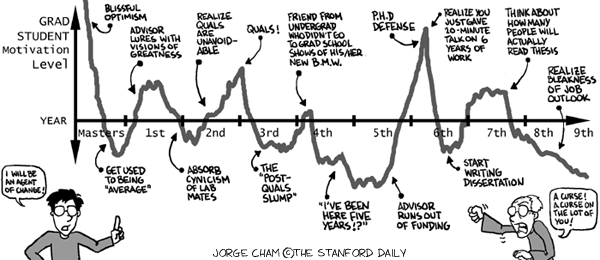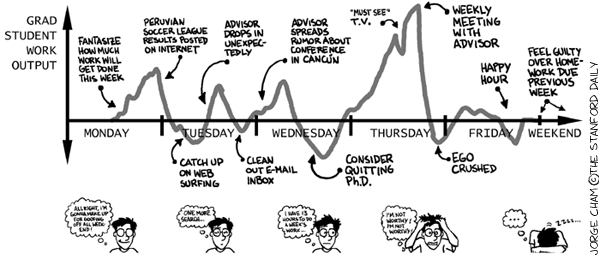About two weeks ago I attended a free webinar from the European PRIDE network about “Research Careers, well-being and mental health.”
It was a follow-up from their first webinar on the same topic because they had so many questions and so many people attending that it obviously needed more discussion time. You can watch the first webinar (1h) here and listen to a shorten version of the follow-up webinar as a podcast here (20min).
The follow-up was then dedicated to attendees’ question and we could submit some while registering. I had submitted one and was positively surprised to see it asked during the event 😊 But it didn’t make it to the podcast so one more reason for me to make it into a blog post here!
The speakers’ answers inspired me to write today’s blog post.
A quick presentation of the two speakers using the PRIDE network website:
- Dr. Desiree Dickerson “clinical psychologist who specialises in the mental health and well-being of researchers and the academic community.”
- Dr. Gábor Kismihók “expert in Researcher Career Management and chair of the recently started COST Action on Researcher Mental Health.”
My question was approx.:
“What would be your advice to current PhD students to survive 2021 and the ongoing pandemic? Like a new year resolution tip.”
Dr. Dickerson spontaneously answered:
“Go for the long run.”
This echoes one sentence I tend to quote (probably too much ^^’) to doctoral students around me: “A PhD isn’t a sprint, it’s a marathon.” And then trying to explain that they’ll need to take care of themselves to make it up till the end.
Dr. Dickerson was further saying how in academia we have the tendency to work in sprint/down/sprint/down rhythm. Making me think of the roller coaster feeling many people experience during a PhD and as nicely illustrated by PhDcomics already back in 1999!


In other words, the advice here is: try to flatten your own mental health curve. Try to go steady instead of getting exhausted during a sprint and then needing a very down time to recover.
Dr. Dickerson was then adding that we need to “learn how to relax.” Again a great point!
It kind of sounds crazy but it’s actually true that as academics/research-passionate/work-alcoholic we sometimes forget how to relax. What to do during off times? What to do on Thursday at 10 p.m. rather than checking work emails? What to do to turn a cold rainy Sunday into a nice relaxing day instead of chewing over the same work-related worries?
Just like for too many PhD students who might already be falling into anxiety or depression, even more strongly in these crazy times of social distancing of COVID19 pandemic, answering these questions might really not be obvious.
Well, that’s the take-home message I would like to insist on here today: learn to flatten your own mental health curve so that you can make it on the long run! Meaning it’s a process, and that there isn’t 1 single answer, nor 1 single way for taking care of ourselves, but rather that we need to figure out what works out for us.
The good news is that, as academics, learning is something we are good at! :) Self-pace learning, it might need some research, reading stuff online, chatting with other people, making trials, see what works for oneself, get help if needed, taking the time, there is a whole year to experiment, actually a whole life!
Take care everyone and thanks again to Dr. Dickerson and Dr. Kismihók (who’s great advice might make up another blog post here one day) and to the PRIDE network for such great free webinars! 🙏 I strongly recommend everybody to watch and listen to the original webinars!
More about PhD students mental health here.
Would you like two other good new year’s resolutions for 2021? Check your public holidays now and sign up here to get my next blog post directly in your inbox! 👍
Further reading:
I felt very bright thinking about “flatten your mental health curve” but, of course, I’m not the first one who thought about it, quite the contrary in fact! ^^ Here some great pieces on the subject:
- Flattening the curve of mental ill-health: the importance of primary prevention in managing the mental health impacts of COVID-19, S. R. Carbone, Ment Health Prev. 2020 Sep; 19: 200185. doi: 10.1016/j.mhp.2020.200185
- Burning Out, by Colleen Flaherty, September 2020, on InsideHigherED
- Professors must support the mental health of trainees during the COVID-19 crisis, by June Gruber, May 2020, on Science Mag
I also tried to look for the source of the quote “A PhD isn’t a sprint, it’s a marathon” and I couldn’t find it, but I came across this interesting piece:
- The piece of dissertation wisdom that made me want to scream, guest post on the Thesis Whisperer blog, February 2012
Do you know if there is and who is at the source of this saying? Please let me know in the comment! 😃




